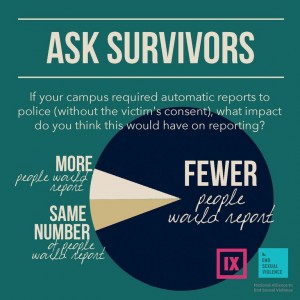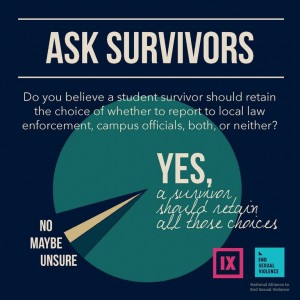In the wake of controversies at colleges and universities across the country, legislators have introduced a series of bills that would dramatically alter how sexual violence on campus is handled by forcing police involvement. These bills, commonly known as “mandatory referral” or “mandatory reporting” laws, would require that survivors’ reports be turned over to law enforcement without their consent. Some bills even include provisions that would criminalize professors who respected survivors’ desire for confidentiality.
While these proposals may seem intuitive to many – and indeed may be well-intentioned efforts by lawmakers to support survivors – if passed, mandatory reporting bills will leave students less safe, not more.
- Mandatory reporting bills force survivors into a broken system
- Mandatory reporting bills make campuses less safe by decreasing reporting to schools
- Mandatory reporting bills make it more difficult for survivors to receive the Title IX services and accommodations to which they are entitled
Below are talking points we’ve found helpful in our efforts to resist mandatory reporting legislation. Please contact us for additional support in educating your lawmaker about the dangers of this type of legislation and resisting efforts to pass it.
1. Mandatory reporting bills force survivors into a broken system.
By any measure, the criminal justice system is a broken system. As we note here, only a quarter of all reported rapes lead to an arrest, only a fifth lead to prosecution, and only half of those prosecutions result in felony convictions. Not all state laws cover sexual violence perpetrated by women or by a person the same sex as the victim; some don’t recognize men as victims at all. For many survivors, particularly domestic/dating violence and stalking victims, reporting to the police, to then have their case dismissed, can result in violent – even fatal – retaliation from their perpetrator.
Schools, unlike the state, must take up every report for adjudication and response according to the victim’s wishes. For most campus survivors, then, their school may be their only resource for justice and safety. If students are forced into a criminal justice system that fails to remedy the harms they’ve experienced, they will likely suffer further trauma from the process.
2. Mandatory reporting bills make campuses less safe by decreasing reporting to schools.
 Many lawmakers approach the issue of campus sexual violence from a crime-reduction perspective. For such legislators, it can be particularly powerful to point out the reality that, when reporting is taken out of survivors’ control, survivors become even more reluctant to come forward to anyone at all (including campus officials) – and reporting rates decrease as a result. That means legislators’ explicit goal – to reduce violence – will fail, as perpetrators are more likely to reoffend with impunity.
Many lawmakers approach the issue of campus sexual violence from a crime-reduction perspective. For such legislators, it can be particularly powerful to point out the reality that, when reporting is taken out of survivors’ control, survivors become even more reluctant to come forward to anyone at all (including campus officials) – and reporting rates decrease as a result. That means legislators’ explicit goal – to reduce violence – will fail, as perpetrators are more likely to reoffend with impunity.
Educate your lawmakers about the fact that rape is the most underreported crime in the United States and explain the common reasons why survivors routinely choose not to report to the police, such as:
- Fear or distrust of law enforcement, particularly in already heavily policed communities, or among survivors who have been assaulted by police officers
- Desire to protect their perpetrator, who may be a former (or current) partner, family member, boss, professor, or friend
- Unwillingness to participate in a time-intensive, often re-traumatizing criminal process that can take years to resolve
- Recognition that the criminal justice system creates and perpetuates violence rather than meaningfully reducing it. For instance, people of color and low-income people are disproportionately incarcerated, and rape itself is rampant and unchecked in prisons.
- Fear of deportation or criminalization themselves
- Recognition of law enforcement’s historical and enduring failure to hold perpetrators accountable
- State laws’ failure to recognize certain acts as violent (e.g., emotional or financial abuse, or cyber-harassment)
- State laws’ failure to recognize certain victims (e.g., male and gender-queer survivors)
3. Mandatory reporting bills make it more difficult for survivors to receive the Title IX services and accommodations to which they are entitled.
Time and again we hear from survivors that, if their reports to campus officials were to go to police without their consent, they wouldn’t report to anyone at all. In fact, Know Your IX and the National Alliance to End Sexual Violence (NAESV) conducted an online survey in March 2015 to gauge survivors’ beliefs about the criminal justice system, victim autonomy, and reporting. Almost 90% of survivors said that campus victims should retain the right to choose whether and to whom to report. Eighty-eight percent (88%) said that, were campuses required to turn rape reports over to the police (without survivors’ consent), they believe fewer victims would report to anyone at all. Seventy-two percent (72%) were concerned that such requirements would lead to survivors being “forced to participate in the criminal justice system / go to trial.”
Mandatory referral policies would result in survivors losing out on many of the Title IX-mandated services and accommodations to which they are entitled, such as free counseling services, academic tutoring, dorm changes, no-penalty course withdrawals, and access to disciplinary proceedings. Without these supports, many survivors would see their grades plummet, lose scholarships, or be forced to drop out of school altogether.
To put it simply: Survivors need Title IX’s protections – and to feel safe accessing them – in order to stay in school.
4. Mandatory reporting bills reduce survivors’ autonomy when lawmakers should be working to increase the number of options available to victims in the wake of violence instead.
For many lawmakers, frustration over the mishandling of sexual violence complaints at universities is their entry point to efforts pushing mandatory reporting bills. Remind your legislators that forcing survivors from one failing system into another failing system isn’t a solution: it’s a perpetuation of the problem. Ask them instead to demand tougher enforcement of schools’ Title IX obligations, from both the courts and the Department of Education’s Office for Civil Rights (more on this below).
And let them know that providing multiple reporting options increases survivor autonomy and, accordingly, increases reporting rates. For instance, schools that provide multiple reporting options (that are clear and transparent) have seen their rates of reports increase, as survivors feel more comfortable coming forward.
Finally, make sure to educate your lawmakers about the reasons that schools handle sexual violence cases in the first place – and why that’s a good thing. Check out our resource here.
Lawmakers interested in engaging on the issue of campus sexual violence can take other steps to support survivors that are far more effective:
- Increase appropriations for the Department of Education’s Office for Civil Rights (OCR) and the Department of Justice’s Civil Rights Division (CRT) – the federal agencies primarily responsible for enforcing Title IX by holding schools accountable for failing to keep students safe, which are currently severely under-resourced and under-staffed;
- Improve private civil rights of action for survivors on and off campus;
- Pass consent education requirements for elementary, middle, and high schools, such as Senators Kaine, McCaskill, and Blumenthal’s bill;
- Increase state and federal funding for service providers;
- Pass “yes means yes” affirmative consent legislation;
- Remove barriers to survivors obtaining civil protection orders (CPOs), such as by permitting rural survivors to apply for and receive CPOs online.
5. Mandatory reporting bills are opposed – loudly – by the very groups to which legislators might expect to appeal for support: survivors and women’s groups.
 In the few states in which mandatory reporting bills have been proposed so far, survivors and advocates have fought tooth and nail to prevent the passing of this legislation. Well-intentioned lawmakers concerned about supporting survivors – as well as pragmatic legislators concerned about optics – should know that their efforts will face vocal opposition from the very people their efforts purport to help.
In the few states in which mandatory reporting bills have been proposed so far, survivors and advocates have fought tooth and nail to prevent the passing of this legislation. Well-intentioned lawmakers concerned about supporting survivors – as well as pragmatic legislators concerned about optics – should know that their efforts will face vocal opposition from the very people their efforts purport to help.
For tips on how to approach your lawmaker, check out our resource here.
Resources
Dana Bolger and Alexandra Brodsky at MSNBC: “Victim’s choice, not police involvement, should be lawmakers’ priority”
Alexandra Brodsky at Feministing: “Mandatory referral of rape reports from schools to police is a bad idea”
Alexandra Brodsky at Know Your IX: “Why schools handle sexual violence reports”
Max Ehrenfreund in the Washington Post: “Virginia wants to force universities to report every rape to the police. But that won’t solve U-Va.’s real problem”